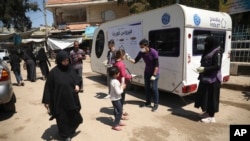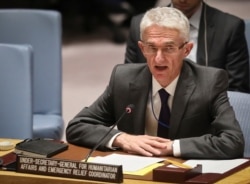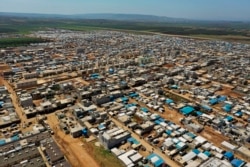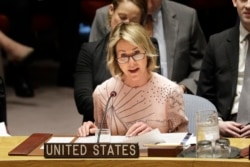The U.N. humanitarian chief warned Wednesday that war-torn Syria faces a catastrophe if the coronavirus takes hold in the country.
“If this virus is behaving similarly in Syria to how it has elsewhere — and that is our assumption for now — then tragedy beckons,” Mark Lowcock told the U.N. Security Council in a remote meeting Wednesday.
He said the country’s health care system, crippled by nearly a decade of war, cannot cope with an outbreak that is challenging even the richest nations.
“We cannot expect mitigation measures to succeed where millions are displaced in crowded conditions, without adequate sanitation, and no assets or safety net to fall back on,” he said.
The country has 43 confirmed cases and three fatalities, but testing is not widely available. The current cases were recorded in the capital, Damascus, and its suburbs. One fatal case of COVID-19, the disease caused by the coronavirus, was documented in the country’s northeast.
“COVID-19 and its ramifications will become a multiplier of humanitarian needs in Syria,” Lowcock said. “More than ever, this demands a response that uses every possible means of reaching people in need, wherever they are located.”
In the country’s last major rebel stronghold, in the northwestern Idlib province, most aid comes in across the border with Turkey. Lowcock said a cease-fire agreed in early March between Russia and Turkey in the area is largely holding, but the humanitarian situation remains dire.
He said efforts are underway to modify some hospitals to receive coronavirus patients and community-based isolation centers are also being created. But there are shortages of personal protective gear and vital medical equipment.
“At this stage, it is simply impossible to sustain the scale and scope of assistance into the northwest without the cross-border operation,” Lowcock said, of the aid coming from Turkey. “As I have briefed this council before, there is no alternative.”
In Kurdish-controlled areas of the northeast, the U.N. Security Council voted to shut down a vital humanitarian crossing from northern Iraq in January. Council members capitulated under threat of a Russian veto that would have also shuttered two other critical crossing points from Turkey, which have now been reauthorized only until mid-July.
The closed crossing, known as al-Yarubiyah, was a major entry point for medical supplies and aid into the northeastern part of the country. Russia said that humanitarians should send their aid via Damascus across domestic lines, instead of from neighboring nations. But Lowcock said cross-line deliveries of medical aid have been insufficient and shortfalls are increasing.
“At a time when we should be urgently scaling up to prepare for COVID-19, those gaps should be narrowing,” he said. “This is even more critical now that a first case of COVID-19 has been confirmed in the northeast.”
Belgium and Germany hold the humanitarian file for Syria on the council. In a joint statement, they echoed the U.N.’s call for additional cross-line and cross-border access.
“[Germany and Belgium] think this council should consider reopening a crossing point in the northeast of the country, urgently,” German Ambassador Christoph Heusgen told council members. “The spread of the virus cannot be stopped by Council tactics, but only by test-kits, protection equipment and ventilators.”
“To stifle aid flows at this perilous moment would defy reason,” U.S. Ambassador Kelly Craft said. “With millions of lives at stake, the United States calls on this Council, our council, to undertake immediate consideration of how to facilitate cross-border aid to all of Syria, regardless of who controls the territory.”
She said that should include a discussion about the possibility of re-authorizing the use of al-Yarubiyah.
But Russia’s envoy strongly signaled that his delegation would not be open to revisiting that possibility.
“We strongly urge our colleagues not to waste their time on looking for a way to advocate — explicitly or implicitly — to get al-Yarubiyah back, and that this is the only solution,” Ambassador Vassily Nebenzia said. “Rather focus on engaging humanitarian agencies in a constructive dialogue with Syrian authorities.”
Syria’s U.N. envoy said U.S. sanctions on his government should be lifted to help the coronavirus response.
“We are not only facing in Syria COVID-19, we are also facing a more dangerous virus, which is terrorism,” Ambassador Bashar Jaafari added of his government’s fight with the opposition and non-state armed groups.
U.N. Secretary-General Antonio Guterres has repeatedly called for a complete and immediate cease-fire throughout Syria to enable efforts to address COVID-19.







